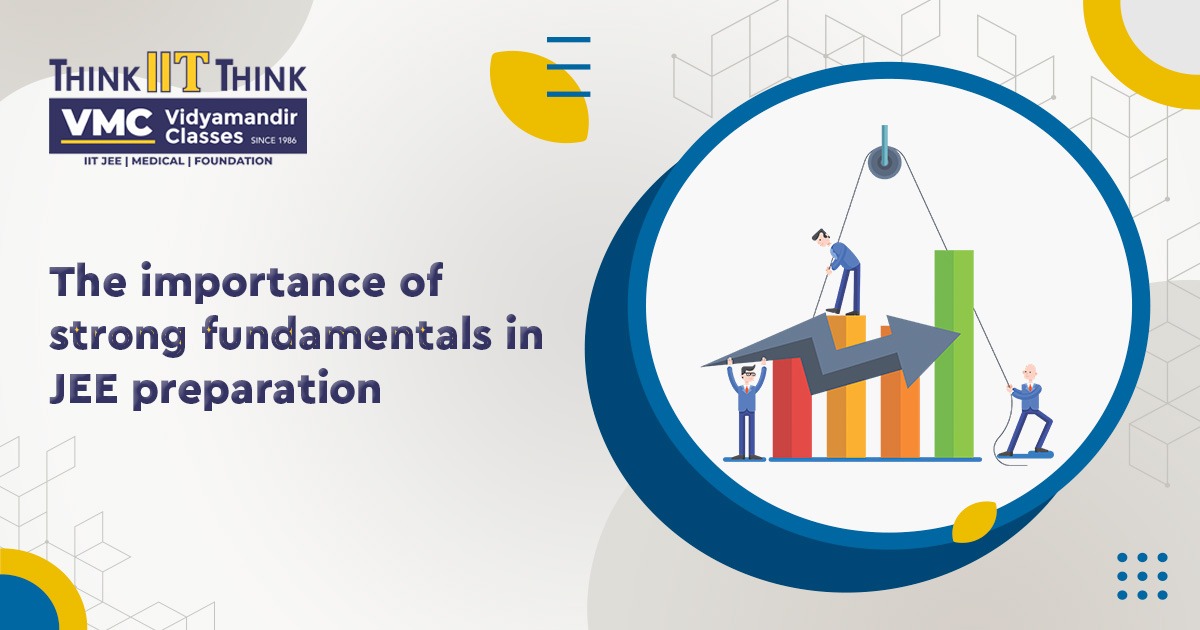The Importance of Strong Fundamentals in JEE preparation!
 Posted On
Posted On
502 total views, 1 views today
The Joint Entrance Examination (JEE) is considered one of the most challenging exams in the world. The exam tests a student’s understanding of a wide range of subjects, including physics, chemistry, and mathematics. As a result, it’s no surprise that students often feel overwhelmed and underprepared. In this blog post, we will discuss the importance of strong fundamentals in JEE preparation and how it can make all the difference in a student’s success.
What are Fundamentals?
In the context of JEE preparation, fundamentals refer to the basic concepts and principles that underlie the different subjects. These concepts include the fundamental laws of physics, the periodic table in chemistry, and mathematical formulas and theorems. Strong fundamentals mean that a student has a solid understanding of these concepts and can apply them in different contexts.
Importance of Strong Fundamentals in JEE Preparation
- Understanding Complex Concepts
JEE preparation involves learning and understanding complex concepts. Strong fundamentals are essential in helping a student understand these concepts because they provide a foundation upon which the more complex concepts are built. If a student lacks a fundamental understanding of a concept, they will struggle to comprehend the more advanced topics that rely on it.
- Better Problem Solving Skills
Solving problems is an important part of the JEE exams. Students with strong fundamentals can approach these problems more confidently because they have a better understanding of the underlying concepts. This allows them to apply the concepts they have learned to solve problems, rather than simply relying on memorization or guesswork.
- Time Management
JEE exams are notoriously challenging, with a limited amount of time given to answer a large number of questions. Students with strong fundamentals can answer questions more quickly because they understand the underlying concepts. This allows them to spend less time on individual questions and more time answering a greater number of questions.
- Confidence
Students who have a strong understanding of the fundamentals are more confident in their abilities. This confidence translates into a better attitude towards learning and an increased willingness to tackle difficult problems. Confidence is also essential when it comes to the JEE exam itself. Students who are confident in their understanding of the fundamental concepts are less likely to feel overwhelmed during the exam.
- Long-term Success
JEE preparation is not just about passing the exam. It is about preparing for a career in science, engineering, or technology. A strong understanding of the fundamentals is essential for long-term success in these fields. Once a student has mastered the fundamental concepts, they will be better equipped to understand the more advanced topics they will encounter in their future studies and careers.
How to Build Strong Fundamentals in JEE Preparation
- Focus on Conceptual Understanding
JEE preparation should focus on building a conceptual understanding of the different subjects. This involves learning the fundamental concepts and understanding how they relate to each other. This approach is more effective than simply memorizing formulas or equations.
- Practice, Practice, Practice
Practice is essential for building strong fundamentals. Students should practice applying the concepts they have learned to different problems. This helps to reinforce their understanding of the concepts and improves their problem-solving skills.
- Get Help When Needed
If a student is struggling to understand a concept, they should seek help from a teacher, mentor, or tutor. A teacher or mentor can explain the concept in a way that is easier to understand and provide additional resources to help the student master the concept.
Final Thoughts
In conclusion, strong fundamentals are essential for success in JEE preparation. They provide a foundation upon which the more complex concepts are built, improve problem-solving skills, help with time management, build confidence, and lead to long-term success in science, engineering, and technology fields.



